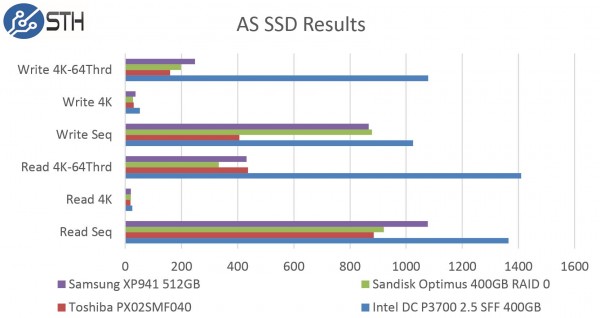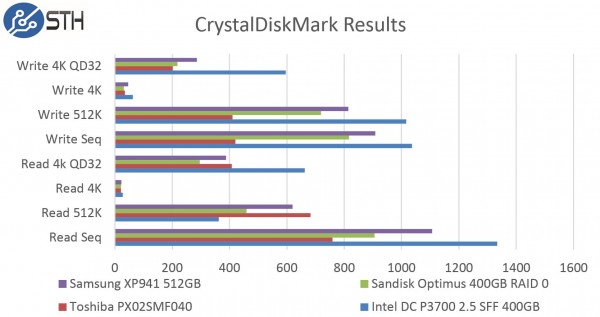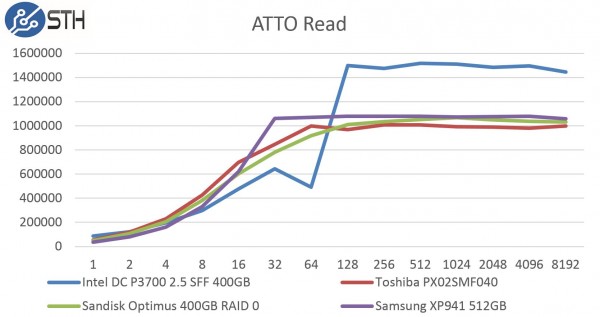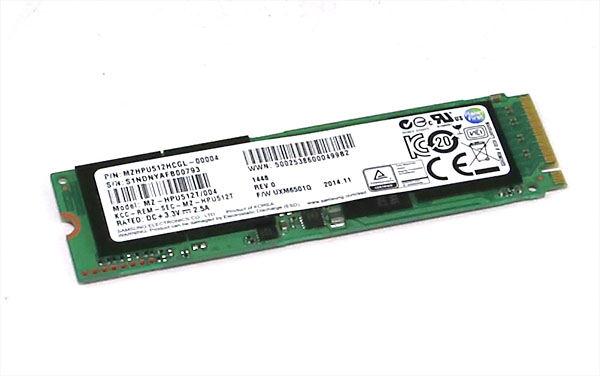Today we are looking at the Samsung XP941 512GB SSD. The Samsung XP941 512GB is a PCIe based SSD and thus has some great performance numbers. The Samsung XP941 is a m.2 form factor PCIe 2.0 x4 SSD. Samsung does have the XP951 coming, which will be a much faster PCIe 3.0 version but that is hard if not impossible to find at the time of this writing. The Samsung XP941 supply largely seems to have been purchased by large OEMs such as Apple, and it is certainly a client SSD. Write endurance figures are not published on Samsung’s spec sheet, but there are numbers floating around the web in the 75TBW range. That is “only” about 150 full drive writes total. Then again, for a client SSD or a SSD mainly handling read heavy workloads, it may make sense as a fast, low power, and inexpensive option for servers. We were able to compare it to a few enterprise SAS drives and the Intel DC P3700 2.5″ 400GB NVMe SSD (using the stock Microsoft NVMe driver) for what should be an interesting comparison.
Test Configuration
Since we are going to assume the use of already released hardware, we are using a legacy system for testing across the test suite:
- Motherboard: Gigabyte GA-7PESH3
- Processors: Dual Intel Xeon E5-2690 (V2)
- SAS Controller: LSI SAS 3008
- RAM: 64GB DDR3L-1600MHz ECC RDIMMs
- OS SSD: Kingston V300 240GB
Intel has signaled that the future is NVMe for performance storage, not SAS. It also is a reason NVMe is going to be a game changer in the enterprise storage space. We did use our NVMe 2.5″ test bed for the P3700 results and we used this PCIe NGFF m.2 converter for the XP941 in our test bed.
Samsung XP941 SSD Quick Benchmarks
For our quick tests during this part of the series we will just provide the quick benchmarks with only a bit of commentary. The results should be fairly straightforward and we have added a few results for comparison purposes. We put our 6.0gbps SAS 2 SSDs (SanDisk Optimus) into RAID 0 and used a Toshiba PX02SMF040 400GB drive for comparison purposes. The SAS drives along with the Intel P3700 all have significantly higher write endurance than the XP941 but we wanted to get a sense of speed here.
AS SSD Benchmark
AS SSD is a solid benchmark that does not write compressible data to drives. The result is perhaps one of the best workstation SSD benchmarks available today.

The Microsoft NVMe driver is known to be excellent in 4K reads/ writes whereas the Intel NVMe driver tends to favor sequential performance. In AS SSD we can see this. Remember, the XP941 we are using costs less than half of any of the other drives we are using. The Intel DC P3700 400GB 2.5″ drive obliterates the competition in most tests but the XP941 is not too far behind.
CrystalDiskMark
CrystalDiskMark is another benchmark which gives non-compressible read/write numbers. This is in contrast to the ATTO Benchmark used by LSI/ Sandforce and its partners when they market a given solid state drive.

In CrystalDiskMark we saw the Intel underperform on the 512K read tests but otherwise the tests saw the Intel drive in front, the Samsung XP941 consumer drive in second and the expensive SAS options falling behind.
ATTO Benchmark
The value of the ATTO benchmark is really to show the best-case scenario. ATTO is known to write highly compressible data to drives, which inflates speeds of controllers that compress data like LSI/ SandForce does prior to writing on a given solid state drive.

In our ATTO read testing, we can get a clear perspective here. The Samsung XP941 512GB is out performing both the dual 6.0gbps SAS drives in RAID 0 as well as the 12gbps Toshiba SAS3 drive. Note, the Intel drive using the Intel driver would put up about 2790000 in the above chart but that skewed results too much to include.

On the write side, the Samsung drive held up fairly well. Again, this is a lower power lower cost option, but using a PCIe slot for a single SSD versus multiple SAS SSDs is not always the best use of a slot. The Toshiba drive is read optimized so we see lower performance there.
Conclusion
In our testing we found the Samsung XP941 512GB to be a very fast drive. Write endurance is something that would need to be minded though as there simply is not too much headroom for this drive. On the other hand, the speed is undeniable and is closer to a higher-end NVMe drive than a standard SATA III or SAS 2 6.0gbps drive. For a read optimized workload, these drives are strong and would be an excellent asset for low power servers as they are fast and have power consumption profiles tuned for low power mobile devices.





Have you had a chance to test these drives with your thermal imager?
I have heard reports that they run hot, and are not recommended for boards with an underside m.2 socket.